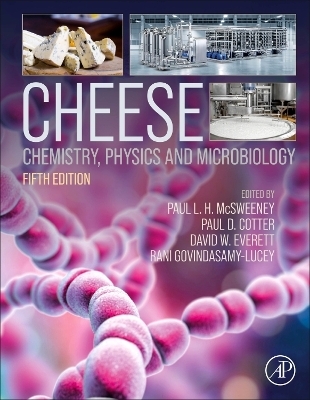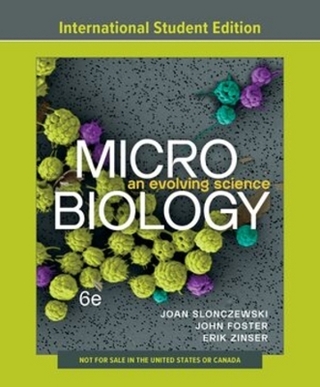
Cheese
Academic Press Inc
978-0-443-15956-5 (ISBN)
- Noch nicht erschienen (ca.
- Versandkostenfrei
- Auch auf Rechnung
- Artikel merken
Divided in two volumes, this book contains by far the most comprehensive coverage of the scientific aspects of this important dairy product, covering all aspects of cheese manufacture and ripening from the standpoint of basic science (vol 1). In addition, coverage is included of all major families of cheese (vol 2).
Paul McSweeney is Professor of Food Chemistry in the Department of Food and Nutritional Sciences, University College, Cork, Ireland (UCC). He graduated with a BSc (Hons) in Food Science and Technology in 1990 and a PhD in Food Chemistry from UCC in 1993 and also has an MA in Ancient Classics and a Post-Graduate Certificate in Teaching and Learning in Higher Education (2012). He spent seven months (Jan-Aug, 2014) as interim head of the College of Science, Engineering and Food Science in UCC. He worked for a year in the University of Wisconsin (1991-2) as part of PhD and as a post-doctoral research scientist in UCC (1993-4). He was appointed to the academic staff of UCC in 1995. Prof McSweeney is an experienced lecturer and researcher and has successfully managed research projects funded through the Food Industry Research Measure and its predecessors administered by the Irish Department of Agriculture and Food, the EU Framework programs, the US-Ireland Co-operative Program in Agriculture/Food Science and Technology, Bioresearch Ireland and industry. He was awarded the Marschall Danisco International Dairy Science Award of the American Dairy Science Association in 2004 and in 2009 a higher doctorate (DSc) on published work by the National University of Ireland. Prof Paul Cotter is a Senior Principal Research Officer and Head of Food Biosciences at Teagasc Food Research Centre at Teagasc, Moorepark, Fermoy, Ireland. He is also the CTO/co-founder of SeqBiome, a microbiome sequencing and bioinformatics service provider. Prof Cotter is a molecular microbiologist, with a particular focus on the microbiology of foods (especially fermented foods), the food chain and of humans, as well as probiotics, postbiotics and bacteriocins. This research has been funded through Irish funding agencies, the European Union and a wide range of industry collaborations. Prof Cotter is the author of >400 peer-reviewed in highly impacting journals such as Cell, Nature, Nature Foods, Nature Aging, Nature Medicine, Nature Reviews Microbiology, Nature Reviews Gastroenterology & Hepatology, was included in the Clarivate list of highly cited researchers for 2018-2023, received an honorary doctorate from the University of Antwerp in 2024 and is the Field Chief Editor of Frontiers in Microbiology. Dr. Everett is a Principal Investigator at the Riddet Institute and an adjunct Professor at Massey University in New Zealand. He is originally from Australia and completed his PhD in Food Science at the University of Wisconsin, Madison. His academic career includes a post-doctoral fellowship at the University of Guelph, Canada, and a food science faculty member at the Victoria College of Agriculture and Horticulture at the University of Melbourne in Australia and the University of Otago in New Zealand. More recently he was the holder of the Leprino Foods Endowed Professorship at California State University–San Luis Obispo where he also directed the Dairy Innovation Institute research center. He has worked on dairy industry projects at a federal government research center in Australia (CSIRO) to help develop a technology to manufacture hard cheese from ultrafiltered milk, and at a dairy industry-funded company as a science liaison manager to bring together publicly-funded researchers with the dairy industry to solve technical problems. His current research is on the impact of dairy food structure on digestibility and in vitro nutritional bioaccessibility. Dr. Rani Govindasamy-Lucey is a Distinguished Scientist in the Center for Dairy Research (CDR), University of Wisconsin-Madison, USA. She graduated with a BS degree in Biochemistry (Hons) in 1989 and a PhD in Biochemistry in 1996 from the National University of Singapore. She worked from 1995-1999 as a food scientist at the Crop and Food Research Institute (New Zealand) and then later as a post-doctoral fellow with Massey University and jointly with the New Zealand Dairy Research Institute. She joined the CDR in 1999 where she has worked for the past 25 years as a scientist. She leads the research group within the CDR, as well as the sensory and analytical programs. She also oversees industry research projects and has mentored numerous graduate students. She was chair of the organizing committee for the 2012 IDF Cheese Ripening and Technology conference held in Madison, she was given the College of Agriculture and Life Sciences (CALS) research award in 2017 and the 2024 International Dairy Foods Association (IDFA) research award in dairy foods processing by the American Dairy Science Association (ADSA). She is also currently a director of ADSA. She has published extensively on topics like cheese yield, the use of membrane filtration for cheesemaking and the functionality and textural properties of cheese. She is currently working on cheese snacks and extending the shelf-life of various types of cheeses. She also enjoys working with the many companies that come to CDR for assistance and she coordinates the advanced cheesemaking short courses at the CDR.
Volume 1: GENERAL ASPECTS
Section 1. Introduction
1 Cheese: An overview
2 Milk for cheesemaking
Section 2. Coagulation of milk
3 Rennets: applied aspects
4-new authors Chymosin and other acid proteinases
5 Rennet-induced coagulation of milk
6 Syneresis of the rennet coagulum
7 Formation and structure of acid milk gels
Section 3. Starters & Manufacture
8 Starter Cultures: general aspects
9 Genetics of lactic acid bacteria
10 Bacteriophage
11-new authors Secondary and adjunct starters
12 Other components of the cheese microbiota
13-new authors Salt in cheese: physical, chemical and biological aspects. Water activity
Section 4. Cheese Ripening
14 Cheese ripening: introduction and overview
15 Microbiological changes during ripening
16 Biochemistry of cheese ripening.
1. Metabolism of residual lactose and of lactate and citrate
17 Biochemistry of cheese ripening.
2. Lipolysis and metabolism of fatty acids
18-new authors Biochemistry of cheese ripening.
3. Proteolysis
19-new authors Biochemistry of cheese ripening.
4. Amino acid catabolism
20 Cheese flavour: Sensory and instrumental analysis
21 Acceleration and modification of cheese ripening
22 Structure and texture of cheese
Section 5. Public Health Aspects
23 Growth and survival of microbial pathogens in cheese
24 Mycotoxins in cheese
25-new authors Nutritional aspects of cheese
26-new chap Cheese structure and digestibility
Volume 2: CHEESE TECHNOLOGY AND MAJOR CHEESE GROUPS
Section 1. Cheese Technology
27-new authors Factors affecting cheese quality
28 General aspects of cheese technology
29-new authors Application of membrane separation technology to cheese production
30-new authors Low-fat and low sodium cheese
31-new authors Cheese as a food ingredient (inc EMC)
32 Legislation
33 Diversity of cheese varieties: an overview
34 Extra-hard varieties
35-new authors Cheddar and related dry-salted cheese varieties
36 Gouda and related cheeses
37 Cheese with propionic acid fermentation
38 Surface mould-ripened cheeses
39 Blue cheese
40 Bacterial surface-ripened cheeses
41-new authors Varieties ripened under brine
42 Pasta-filata cheeses
43 Cheeses from ewes’ and goats’ milk
44 Cheeses from buffalo milk
45 Quarg
46-new chap Acid-curd and acid/heat coagulated cheeses
47 Scandinavian whey cheeses
48-new authors Processed cheese products
| Erscheint lt. Verlag | 25.4.2025 |
|---|---|
| Verlagsort | San Diego |
| Sprache | englisch |
| Maße | 216 x 276 mm |
| Themenwelt | Naturwissenschaften ► Biologie ► Mikrobiologie / Immunologie |
| Technik ► Lebensmitteltechnologie | |
| ISBN-10 | 0-443-15956-4 / 0443159564 |
| ISBN-13 | 978-0-443-15956-5 / 9780443159565 |
| Zustand | Neuware |
| Informationen gemäß Produktsicherheitsverordnung (GPSR) | |
| Haben Sie eine Frage zum Produkt? |
aus dem Bereich
